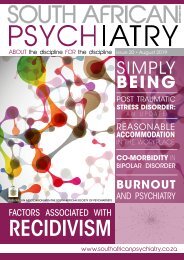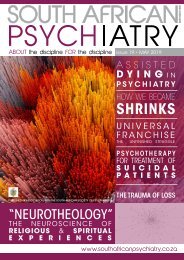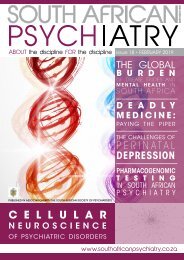South African Psychiatry - November 2018
South African Psychiatry - November 2018
South African Psychiatry - November 2018
Create successful ePaper yourself
Turn your PDF publications into a flip-book with our unique Google optimized e-Paper software.
Adult ADHD is debilitating...<br />
Change that,<br />
make every<br />
moment<br />
a lightbulb<br />
moment.<br />
ALLOW ADULTS WITH ADHD TO PERFORM AT THEIR BEST.<br />
Approximately 2 out of 3 ADHD children grow up to be ADHD adults 1<br />
Ritalin ®<br />
• Reduced inattention 2*<br />
• Reduced impulsive behaviour 2*<br />
• Improved response inhibition 3†<br />
• Well tolerated 2*<br />
RitalinLA<br />
Unleashing potential 2<br />
*Compared to placebo in a randomized, 6-week, placebo-controlled, parallel study of methylphenidate in 146 adult patients with DSM-IV ADHD 2 . † Response inhibition was assessed with the “tracking” stop-signal test in 13 adults with a diagnosis of ADHD, both while taking and while not taking medication, and<br />
13 healthy, unmedicated, age- and intelligence quotient-matched control subjects 3 .<br />
References: 1. Faraone SV, Biederman J, Mick E. The age-dependent decline of attention deficit hyperactivity disorder: a meta-analysis of follow-up studies. Psychological Medicine 2006; 36(2): 159-165.. 2. Spencer T, Biederman J, Wilens T, et al. A Large, Double-Blind, Randomized Clinical Trial of Methylphenidate in<br />
the Treatment of Adults with Attention-Deficit/Hyperactivity Disorder. Biol Phsychiatry 2005;57:456-463. 3. Aron AR, Dowson JH, Sahakian BJ, Robbins TW. Methylphenidate Improves Response Inhibition in Adults with Attention-Deficit/Hyperactivity Disorder. Soc Biol <strong>Psychiatry</strong> 2003;54:1465-1468.<br />
S6 RITALIN ® 10: B/1.2/1610. RITALIN ® LA 10: 44/1.2/0594. RITALIN ® LA 20: 36/1.2/0186. RITALIN ® LA 30: 36/1.2/0187. RITALIN ® LA 40: 36/1.2/0188. Composition: Tablets containing 10 mg methylphenidate hydrochloride. Modified-release capsules (RITALIN ® LA) containing 10 mg, 20 mg, 30 mg and 40 mg<br />
methylphenidate hydrochloride respectively. Pharmacological Classification: A 1.2 Psychoanaleptics (antidepressants). Indications: Attention deficit hyperactivity disorder (ADHD). The diagnosis should be made according to current DSM criteria or the guidance from International Classification of Diseases (ICD).<br />
RITALIN ® 10 only: narcolepsy in adults. Contraindications: Hypersensitivity to methylphenidate or to any of the excipients, anxiety, tension, agitation, hyperthyroidism, pre-existing cardiovascular disorders including hypertension, angina, arterial occlusive disease, heart failure, haemodynamically significant congenital<br />
heart disease, cardiomyopathies, myocardial infarction, potentially life-threatening dysrhythmias and channelopathies (disorders caused by dysfunction of ion channels), QT prolongation either congenital, familial or caused by medication; during treatment with monoamine oxidase (MAO) inhibitors, or within a minimum<br />
of 2 weeks of discontinuing those medicines due to risk of hypertensive crisis; glaucoma, phaeochromocytoma, diagnosis or family history of Tourette’s syndrome. Pregnancy and lactation. Warnings and Special Precautions: Treatment with RITALIN ® is not indicated in all cases of Attention-Deficit/Hyperactivity disorder<br />
and should be considered only after detailed history-taking and evaluation. Generally should not be used in patients with structural cardiac abnormalities or other serious cardiac disorders that may increase the risk of sudden death. Preexisting cardiovascular disorders, a family history of sudden death and ventricular<br />
arrhythmia should be assessed before initiating treatment. RITALIN ® increases heart rate and systolic and diastolic blood pressure. Therefore, caution is indicated in treating patients whose underlying medical conditions might be compromised by increases in blood pressure or heart rate, e.g. those with pre-existing<br />
hypertension and severe cardiovascular disorders. Blood pressure should be monitored at appropriate intervals in all patients taking RITALIN ® . Patients who develop symptoms suggestive of cardiac disease should undergo prompt cardiac evaluation. Misuse may be associated with sudden death and other serious<br />
cardiovascular adverse events. Patients with pre-existing cerebrovascular abnormalities should not be treated with RITALIN ® . Patients with additional risk factors (history of cardiovascular disease, concomitant medications that elevate blood pressure) should be assessed regularly for neurological/psychiatric signs and<br />
symptoms. Pre-existing psychiatric disorders and a family history of psychiatric disorders should be assessed before initiating treatment. Should not be initiated in patients with acute psychosis, acute mania or acute suicidality. Consider treatment discontinuation in patients who experience psychotic symptoms, including<br />
visual and tactile hallucinations or mania. In case of emergent psychiatric symptoms or exacerbation of preexisting psychiatric symptoms, RITALIN ® should not be given to patients unless the benefit outweighs the potential risk. Evaluate the need for adjustment of treatment regimen in patients experiencing behavioural<br />
changes such as aggressive behaviour. Treatment interruption can be considered. Family history should be assessed and clinical evaluation for tics or Tourette’s syndrome in children should precede ADHD treatment. Patients should be regularly monitored for the emergence or worsening of tics during treatment initiation.<br />
Growth and weight should be monitored during treatment and treatment may need to be interrupted and adjusted. Caution in patients with epilepsy. Chronic abuse can lead to marked tolerance and psychological dependence. Caution in emotionally unstable patients. Careful supervision during withdrawal. Blood<br />
count monitoring during long-term treatment. Consider appropriate medical intervention in the event of haematological disorders. Not indicated for children under 6 years of age. Refrain from driving and using machinery if dizziness, drowsiness, blurred vision, hallucination or other CNS side effects occur. Tablets not<br />
to be taken by patients with lactose intolerance and capsules not to be taken by patients with fructose intolerance, glucose-galactose malabsorption or sucrase-isomaltase insufficiency. RITALIN ® 10 (containing lactose) and RITALIN ® LA (containing sucrose) may have an effect on the glycaemic control of patients with<br />
diabetes mellitus. Interactions: Concomitant use contraindicated: MAO inhibitors (currently or within the preceding 2 weeks). Caution when used concomitantly with drugs that elevate blood pressure, coumarin anticoagulants, anticonvulsants, centrally acting alpha-2 agonists (e.g. clonidine or dexmedetomidine),<br />
direct and indirect dopaminergic drugs (e.g. tricyclic antidepressants, DOPA, dopamine agonists (antipsychotics, e.g. haloperidol). Alcohol: patients should abstain from alcohol during treatment. Ritalin should not be taken on the day of a planned surgery due to risk of sudden blood pressure increase during surgery.<br />
Dosage: Dosage should be individualised according to the patient’s clinical needs and responses. Maximum daily dose is 60 mg for narcolepsy in adults and ADHD in children. Maximum daily dose is 80 mg for treatment of ADHD in adults. If improvement is not observed after appropriate dosage adjustment<br />
over a one-month period, RITALIN ® should be discontinued.Narcolepsy in adults: Average dose (tablets only) is 20 – 30 mg daily given in 2 – 3 divided doses. ADHD in children and adolescents (6 years and older): Tablets: start with 5 mg once or twice daily and increase in increments of 5 to 10 mg weekly.<br />
Capsules: recommended starting dose of RITALIN ® LA is 20 mg. Can begin treatment with RITALIN ® LA 10 when a lower initial dose is appropriate. ADHD in adults: Only the RITALIN ® LA formulation to be used. Starting dose is 20 mg in patients new to methylphenidate. In patients currently using methylphenidate,<br />
treatment to be continued with the same daily dose. Refer to the package insert for full dosing information. RITALIN ® LA is for once daily administration. Side effects: Very common: nervousness, insomnia, nasopharyngitis, decreased appetite, nervousness, insomnia. Common: Anxiety, restlessness, sleep disorder,<br />
agitation, headache, drowsiness, dizziness, dyskinesia, tremor, tachycardia, palpitation, dysrhythmias, changes in blood pressure and heart rate (usually an increase), abdominal pain, nausea, vomiting, dry mouth, rash, pruritus, urticaria, fever, scalp hair loss, hyperhidrosis, arthralgia, feeling jittery, weight decreased.<br />
Rare: difficulties in visual accommodation, blurred vision, angina pectoris, reduced weight gain and growth retardation during prolonged use in children. Very rare: leucopenia, thrombocytopenia, anaemia, hypersensitivity reactions, hyperactivity, psychosis (sometimes with visual and tactile hallucinations), transient<br />
depressed mood, convulsions, choreoathetoid movements, tics or exacerbation of existing tics and Tourette’s syndrome, cerebrovascular disorders including vasculitis, cerebral haemorrhages and cerebrovascular accidents, thrombocytopenic purpura, exfoliative dermatitis, erythema multiforme, muscle cramps. Other<br />
possible adverse reactions: pancytopenia, hypersensitivity reactions, such as auricular swelling, including angioedema and anaphylaxis, anxiety, irritability, aggression, affect lability, agitation, abnormal behaviour or thinking, anger, suicidal ideation or attempt (including completed suicide), mood altered, mood swings,<br />
hypervigilance, mania, disorientation, libido disorder, apathy, repetitive behaviours, over-focussing, confusional state, cases of abuse and dependence have been described, tremor, reversible ischaemic neurological deficit, migraine, diplopia, mydriasis, visual disturbance, cardiac arrest, myocardial infarction, peripheral<br />
coldness, Raynaud’s phenomenon, cough, pharyngolaryngeal pain, dyspnoea, diarrhoea, constipation, angioedema, hyperhidrosis, erythema, fixed drug eruption, myalgia, muscle twitching, haematuria, gynaecomastia, chest pain, fatigue, sudden cardiac death, cardiac murmur, neuroleptic malignant syndrome. Packs:<br />
RITALIN ® 10 is supplied in blister packs of 30. RITALIN ® LA range is available in HDPE bottles containing 30 modified-release capsules. This BSS is for use on promotional material linked to MCC approved package insert dated 29 September 2017.<br />
Novartis <strong>South</strong> Africa (Pty) Ltd. Magwa Crescent West, Waterfall City, Jukskei View, 2090. Tel +27 11 3476600. Company Reg No: 1946/020671/07. Kindly report all adverse events and quality complaints occurring with Novartis<br />
product within 24hrs. • Email: patientsafety.sacg@novartis.com • Tel: 0861 929 929 • Fax: +27 11 929 2262 • Or report adverse events directly through our website: https://psi.novartis.com/. To report Quality Complaints email:<br />
qa.phzais@novartis.com. ZA1812935525

















